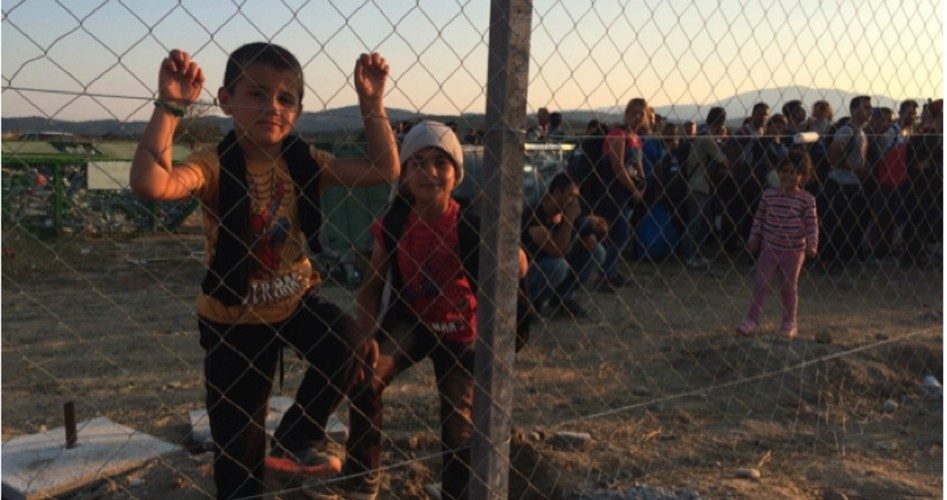
Speaking to the members of the European Parliament in Strasbourg, France, on September 9, Jean-Claude Juncker, president of the European Commission (the executive branch of the European Union), asked EU members to accept 160,000 migrants. Juncker’s statement came in the face of what is regarded by many as one of Europe’s most difficult humanitarian challenges in many years.
Laying the groundwork for his request, Juncker noted that since the beginning of this year, nearly 500,000 refugees have made their way to Europe. The vast majority of them, he stated, are fleeing from war, terrorism, or political oppression in Syria, Libya, or Eritrea. He said that the EU states most affected by the migration are Greece, with more than 213,000 refugees; Hungary, with more than 145,000; and Italy, with more than 115,000. As we noted in a report on September 7, most of the refugees in Hungary are ultimately bound for Germany.
Juncker maintained, “As long as there is war in Syria and terror in Libya, the refugee crisis will not simply go away,” which is probably an accurate statement. He then charged the EU members: “So it is high time to act to manage the refugee crisis. There is no alternative to this.” (Emphasis in original.)
In continuing, however, Juncker’s words make plain how much national sovereignty member states have surrendered to the EU, though he lamented that there is not greater uniformity among members, stating: “Since the early 2000s, the Commission has persistently tabled legislation after legislation, to build a Common European Asylum System.”
Juncker put forth this solution to the refugee crisis:
I call on Member States to adopt the Commission proposals on the emergency relocation of altogether 160,000 refugees at the Extraordinary Council of Interior Ministers on 14 September. We now need immediate action. We cannot leave Italy, Greece and Hungary to fare alone.
One proposal offered by Juncker, while appearing to be made in the interest of efficient processing of asylum seekers, would serve to further undermine what little national sovereignty remains among EU members. He stated:
I also believe that beyond the immediate action needed to address current emergencies, it is time we prepare a more fundamental change in the way we deal with asylum applications — and notably the Dublin system that requires that asylum applications be dealt with by the first country of entry.
In other words, under the present system, EU members states have the right and responsibility to process requests for asylum on their own. Juncker favors a more centralized approach, however:
We need more Europe in our asylum policy. We need more Union in our refugee policy.
A true European refugee and asylum policy requires solidarity to be permanently anchored in our policy approach and our rules. This is why, today, the Commission is also proposing a permanent relocation mechanism, which will allow us to deal with crisis situations more swiftly in the future.
By “solidarity,” Juncker obviously means a uniform, centrally controlled system throughout the EU for processing all asylum requests, thereby denying member states the right to accept or reject migrants who want to cross their borders.
Yet Juncker also asserted, “A united refugee and asylum policy also requires stronger joint efforts to secure our external borders.” He added, “Fortunately, we have given up border controls between the Member States of the Schengen area, to guarantee free movement of people, a unique symbol of European integration.”
Juncker’s description of what has already transpired and what he proposes in order to increase the EU’s common external border security is reminiscent of the rejected Security and Prosperity Partnership of North America (SPP). The SPP was founded in Waco, Texas, on March 23, 2005, by Canadian Prime Minister Paul Martin, Mexican President Vicente Fox, and U.S. President George W. Bush.
In 2006, CNN anchor Lou Dobbs argued that the SPP was part of a plan to merge the United States, Canada, and Mexico into a North American Union similar to the European Union. Multiple articles published by The New American and by its affiliated organization, The John Birch Society, made exactly the same point.
Faced with strong criticism, those seeking to establish the SPP eventually allowed the plan to die. However, the idea itself never died. On February 4, 2011, Canadian Prime Minister Stephen Harper and President Obama announced a new security and prosperity initiative with plans to “pursue a perimeter approach to security in ways that support economic competitiveness, job creation, and prosperity.”
Looking beyond the boundaries of the EU, closer to the source of the conflict that has caused so many refugees to flee, Juncker said:
Today I call for a European diplomatic offensive to address the crises in Syria and in Libya. We need a stronger Europe when it comes to foreign policy. And I am very glad that Federica Mogherini, our determined High Representative, has prepared the ground for such an initiative with her diplomatic success in the Iran nuclear talks. And that she stands ready to work closely together with our Member States towards peace and stability in Syria and Libya.
Unfortunately, Juncker is far off the mark in asserting that a stronger European foreign policy could lead to peace and stability in Syria and Libya. As Alex Newman noted in his article posted by The New American on September 8: “The politicians and establishment figures in the United States and European Union demanding that the West accept millions of Middle Eastern refugees are the same globalists that created the tragic situation in the first place by destroying the countries their victims are fleeing from.”
These countries include Libya, Syria, Iraq, and Afghanistan.
Focusing on the area that is now the epicenter of the turmoil responsible for most of the mass exodus from the region — the Syria-Iraq border — the two factors most responsible for the upheaval were the U.S. invasion of Iraq that removed Saddam Hussein and created a power vacuum in that nation, and the U.S. support for the rebel forces attempting to overthrow Syrian dictator Bashar al-Assad. The conflict in Syria began in 2011 as various groups coalesced in an uprising against al-Assad’s government. The now well-known ISIS (also known as the Islamic State of Iraq and the Levant, or ISIL) entered the Syrian civil war on the side of the rebels and by July 2014 was in control of a third of Syria’s territory and most of its oil and gas production.
As the civil war in Syria raged, the United States decided that Assad was an undesirable strongman in the mold of Saddam Hussein who must be removed. And so the U.S. government chose to assist the “moderate” jihadist rebels fighting against Assad. However, many of these U.S.-supported “moderate” rebels defected to al-Qaeda’s Syrian branch, known as Jabhat al-Nusra, which was also allied with ISIS. When these rebels left to join up with ISIS, they reportedly took their heavy U.S.-supplied weapons with them.
Juncker has called for a “stronger” European foreign policy to address the crises in Syria and in Libya. Another term for such a foreign policy is “interventionist,” which is precisely the foreign policy that the United States and its European allies have pursued in the Middle East for at least two decades.
We recently quoted a statement from former Representative Ron Paul (R-Texas), who is well known for his advocacy of a non-interventionist U.S. foreign policy. Paul wrote:
The reason so many are fleeing places like Syria, Libya, Afghanistan, and Iraq is that US and European interventionist foreign policy has left these countries destabilized with no hopes of economic recovery. This mass migration from the Middle East and beyond is a direct result of the neocon foreign policy of regime change, invasion, and pushing “democracy” at the barrel of a gun.
Paul continued by noting: “There was no ISIS in either Iraq or Syria before the 2003 US invasion of Iraq.”
Paul’s advice to “stop meddling in the affairs of other countries” was directed primarily to Americans, but it is also good advice for Juncker and other Europeans who would follow the same path pursued by the United States in destabilizing foreign governments in the interest of promoting “democracy.” Such destabilization creates power vacuums that are filled by terrorist organizations such as al-Qaeda and ISIS. The result is not only death and devastation in the regions controlled by terrorists, but also mass migration as refugees flee the terrorists, creating crises such as that now confronting Europe.
Related articles:
Hungary’s Orban Says Europeans Must Defend Their Borders
The Real Refugee Problem – and How to Solve It
U.S. Defense Intel Chief: Obama Gave “Willful” Aid to Al-Qaeda
U.S. Intel: Obama Coalition Supported Islamic State in Syria
ISIS: The Best Terror Threat U.S. Tax Money Can Buy
Obama and Co. Middle East Policies Aiding Genocide of Christians
Anti-ISIS Coalition Built ISIS (Video)
Globalists Using Muslim Terrorists as Pawns
Christian Massacres: A Result of U.S. Foreign Policy
ISIS Origins Traced to U.S. Prison in Iraq
U.S.-backed Syrian Opposition Linked to Bilderberg, CFR, Goldman Sachs & George Soros


